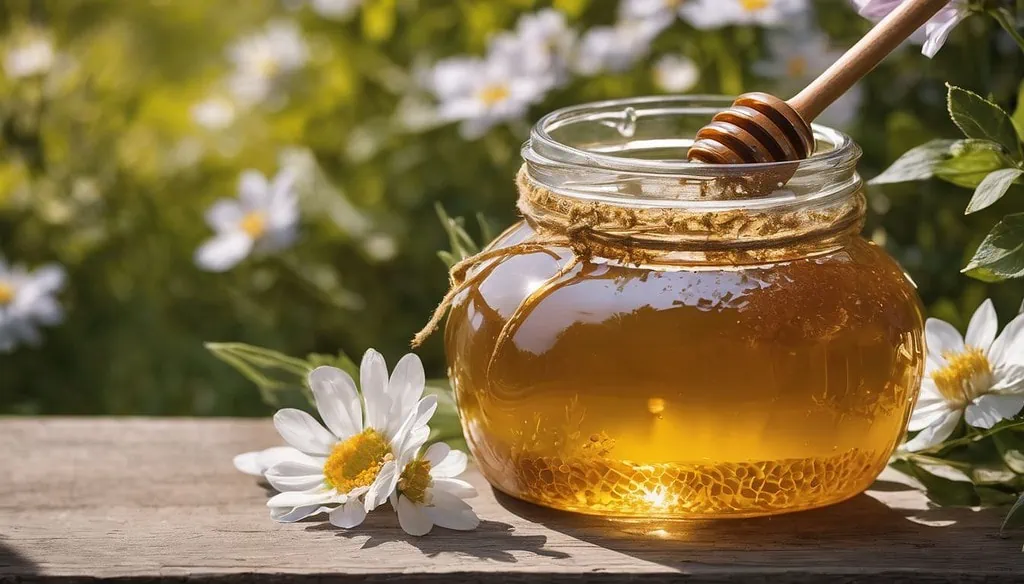Honey, a sweet and natural substance, has often been discussed regarding its consumption during pregnancy. Its benefits include antioxidant properties and the ability to soothe sore throats, making it a tempting choice for expectant mothers.
On the other hand, it carries the risk of containing spores of a bacterium called Clostridium botulinum, which can be harmful to developing infants. Adults and older children normally have immune systems that can handle these spores, but a growing fetus may not. As a result, understanding the potential hazards and advantages is critical for pregnant women considering including honey in their diet.
As a fellow mom and honey fan, I know you want to make the best food choices for your darling child.
Summary
- Honey is generally safe for pregnant women, but it should always be pasteurized to kill harmful bacteria.
- Expectant mothers can enjoy many benefits from honey, like easing digestion problems and promoting skin health.
- It’s important to avoid eating raw honey during pregnancy because it could contain bacteria that harm the unborn child.
- Always consult your doctor before consuming any new food during pregnancy – including honey.
Is It Safe to Eat Honey During Pregnancy?
While there are typical worries regarding honey consumption during pregnancy, it is generally safe when ingested in moderation and offers various potential benefits; however, special safety precautions should be followed to preserve the health of both the mother and the growing baby.
Honey concerns
Many parents, particularly expectant women, are concerned about the safety of honey consumption during pregnancy, and rightfully so. Botulism, a rare but severe illness that can cause paralysis even in adults, stems from bacterial spores found in raw honey and certain other foods.
These bacteria may even infect pasteurized honey in exceedingly rare cases. Because an infant’s immune system lacks the maturity to battle these potentially hazardous spores before they multiply and generate toxins that lead to botulism infection or poisoning, it is unanimously recommended that no child under the age of one year be fed any amount or variety of this golden nectar.
The risks extend to unborn fetuses, whose immune systems may not be ready to handle such an infection quite yet. Following dietary guidelines for pregnant women could help limit the risks posed by maternal honey consumption: avoid raw or unpasteurized honey in favor of safer, pasteurized alternatives during this vital period.

Benefits of honey during pregnancy
Honey, a natural sweetener, has numerous benefits for pregnant women.
Honey is beloved for its natural sweetness and health benefits, making it a popular choice among many people, including pregnant women. Honey has a number of advantages during pregnancy:
- Nutrient Content: Honey contains small amounts of essential prenatal vitamins, minerals, and antioxidants beneficial for maternal health and fetal development.
- Immune System Support: Its antioxidants and antibacterial properties may help boost the immune system, which is crucial for protecting against infections when the immune system is naturally compromised during pregnancy.
- Relief from Common Discomforts: Honey can temporarily relieve common pregnancy discomforts like heartburn, reflux, and sore throats.
- Aid with Sleep: A mixture of honey and milk before bedtime may help alleviate insomnia, a common issue during pregnancy.
- Energy Boost: Honey can provide a quick source of energy, useful during pregnancy when energy levels may be low.
How much honey is safe during pregnancy
Honey eating during pregnancy is controversial, with no set amount recommended. Honey has many health benefits, but it should be consumed in moderation to guarantee safety.
Prioritize raw, high-quality honey sourced from reputable sources. Pasteurized honey may contain hazardous microorganisms such as botulism, putting pregnant women and their unborn children at risk.
As a result, eating honey in moderation and ensuring its quality can optimize its health advantages while limiting potential hazards during pregnancy.
Safety precautions
As a mother of 2, let me share with you my essential safety precautions for honey consumption during pregnancy, as it’s crucial to prioritize both your health and that of your developing baby. While carrying both my children, I’ve always followed this list religiously.
- Always choose pasteurized honey over raw honey. The process of pasteurization helps eliminate any harmful bacteria or toxins that may be present. I’ve always eaten pasteurized honey from specific vendors.
- Limit your intake of honey to avoid spikes in blood sugar levels, which could potentially cause complications during pregnancy. Moderation is key. Usually, I ate a table spoon once per 2 days. I’ve even had a week of not touching honey at all.
- Be aware of the risks associated with bacterial contamination in honey, as pregnant women are more susceptible to certain pathogens found in food.
- Follow the guidelines suggested by foodsafety.gov for maintaining a healthy and balanced diet throughout your pregnancy. Visiting the website will provide additional information on specific brands of honey that had recalls or bad batches.
- Remember that while it is okay to consume honey, it is unsafe for infants under one year due to their underdeveloped digestive systems.
- Consult with your healthcare provider before changing your diet during pregnancy. They can provide accurate information based on your specific health conditions and needs.
What Other Foods Should You Avoid During Pregnancy?
Managing food during pregnancy can be challenging; learn which foods to avoid for your safety and the health of your baby. You’ll learn about the dangers of specific meals and why it’s critical to avoid them.
List of foods to avoid in pregnancy
Pregnancy requires you to eat for two, so it’s critical to understand which foods should be avoided to protect both you and your baby. Here is a list of foods that experts advise you to avoid throughout this festive season:
- Raw honey: Although honey offers numerous health benefits, pregnant women should steer clear of raw honey due to the risk of bacterial contamination.
- Unpasteurized milk, cheese, and juices: These items carry a higher risk of foodborne illnesses that could harm your developing baby.
- Raw meats and deli meats: Besides being vulnerable to bacteria such as Listeria, these can also carry Toxoplasma gondii, the parasite responsible for toxoplasmosis, an infection that can cause severe birth defects.
- Seafood high in mercury or exposed to industrial pollutants: Certain types of fish, such as shark, swordfish, king mackerel, marlin, orange roughy, and tilefish, are known for their high mercury content that may affect fetal brain development.
- Smoked seafood: Unless thoroughly cooked (like in a casserole), they pose potential risks due to Listeria bacteria.
- Raw shellfish and raw eggs: They can harbor harmful bacteria and viruses leading to serious illnesses like salmonella or hepatitis E, respectively.
Make Informed Choices
When determining whether to ingest honey during pregnancy, it is critical to have open conversations with your healthcare physician. They will provide expert advice on how much honey is safe for you and your unborn child, taking into account all potential advantages and hazards.
Based on their advice, make well-informed dietary selections that prioritize the health of both you and your baby. Remember that pasteurized honey reduces the possibility of bacterial spores, making it a safer choice during this time.
